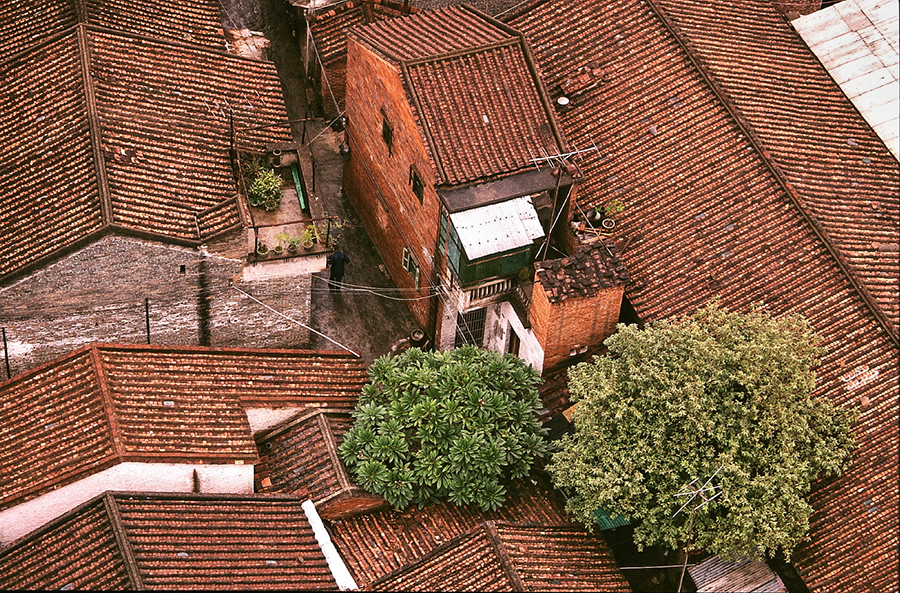A railway that opened up southwest Guangdong
 |
Alleys and rooftops of Old Zhaoqing 1992. [Photo by Bruce Connolly/chinadaily.com.cn] |
In Zhaoqing I would stay at Star Lake Hotel from whose windows I would awake to a view of the waters with a backdrop of verdant mountains warming up in morning sunshine. The hotel was conveniently placed to quickly lose myself within a maze of narrow old town alleys connecting the lake to the West River. The area brimmed with activity -- small walk-in shops, restaurants, children going to and from school -- and as darkness fell night markets illuminated by single light bulbs over food stalls sprang into life. Aromas and sounds of hot wok stir-fry cooking filled the air.
Beyond the alleys, remnants of the city’s historic walls bordering the river led to nine-story Chongxi (“flowery”) Pagoda overlooking the river. Floating restaurants, much favored at that time, greeted diners as many small boats bobbed alongside. The view across to steep hills and villages also swept around to the West River Bridge. Like similar grand structures found in Wuhan or Nanjing it carried both road and rail. The bridge was a vital link connecting southwestern Guangdong with Guangzhou and an excellent location to watch steam locomotives haul their loads.
Several times I travelled across the bridge discovering more of this magnificent railway and the terrain between Zhaoqing and Maoming. The train snaked through narrow gorges, piercing the limestone massifs by tunnels while milky colored water emerging from caves flowed past the track. The Sanmao was truly a fine line to traverse as it continued beyond the San Du River Viaduct passing scenes of seemingly continual agricultural activity. Slopes carried rows of fruit trees and long strips of vegetables or banana plantations. From the train window I watched as buffaloes toiled through the fertile mud of rice paddies. Farmers with baskets suspended from bamboo shoulder poles followed narrow tracks between the cultivated plots. Villages of adobe brick construction centered around fish ponds providing reflections of the area’s stunning geography. People stood with bicycles as the train passed, whistles screeching warnings and chickens scurrying away from the tracks. This was South China’s rural landscape at its best and where else in the world could I view this but from a steam-hauled train?
Baishacun near Sanshui was the Sanmao’s locomotive maintenance depot. In November 1992 a rail buff’s dream materialized -- a visit to the depot. Just like a child I was onto footplates, walking under engines or standing trackside photographing as steam giants hauling freight trains thundered past.
Today Zhaoqing is very much incorporated into the economy of the greater Pearl River Delta. Intercity rail connects with Foshan and Guangzhou. A high speed CRH line to Guizhou skirts the city’s eastern edge. Meanwhile, the Guangmao line carries trains from as far away as Beijing and Northeast China onwards to Hainan, Guangxi and Yunnan. Much has changed but those magnificent steam locomotives are no more.



 Print
Print Mail
Mail

